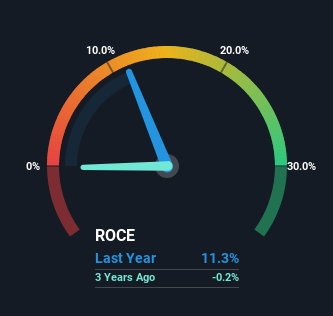- South Korea
- /
- Machinery
- /
- KOSDAQ:A023160
Investors Will Want Tae Kwang's (KOSDAQ:023160) Growth In ROCE To Persist

What trends should we look for it we want to identify stocks that can multiply in value over the long term? In a perfect world, we'd like to see a company investing more capital into its business and ideally the returns earned from that capital are also increasing. Basically this means that a company has profitable initiatives that it can continue to reinvest in, which is a trait of a compounding machine. Speaking of which, we noticed some great changes in Tae Kwang's (KOSDAQ:023160) returns on capital, so let's have a look.
Return On Capital Employed (ROCE): What Is It?
Just to clarify if you're unsure, ROCE is a metric for evaluating how much pre-tax income (in percentage terms) a company earns on the capital invested in its business. To calculate this metric for Tae Kwang, this is the formula:
Return on Capital Employed = Earnings Before Interest and Tax (EBIT) ÷ (Total Assets - Current Liabilities)
0.11 = ₩67b ÷ (₩626b - ₩38b) (Based on the trailing twelve months to September 2023).
Therefore, Tae Kwang has an ROCE of 11%. In absolute terms, that's a satisfactory return, but compared to the Machinery industry average of 7.3% it's much better.
View our latest analysis for Tae Kwang

Above you can see how the current ROCE for Tae Kwang compares to its prior returns on capital, but there's only so much you can tell from the past. If you'd like to see what analysts are forecasting going forward, you should check out our free analyst report for Tae Kwang .
The Trend Of ROCE
Tae Kwang is displaying some positive trends. Over the last five years, returns on capital employed have risen substantially to 11%. The company is effectively making more money per dollar of capital used, and it's worth noting that the amount of capital has increased too, by 33%. This can indicate that there's plenty of opportunities to invest capital internally and at ever higher rates, a combination that's common among multi-baggers.
The Bottom Line
A company that is growing its returns on capital and can consistently reinvest in itself is a highly sought after trait, and that's what Tae Kwang has. Investors may not be impressed by the favorable underlying trends yet because over the last five years the stock has only returned 8.1% to shareholders. So with that in mind, we think the stock deserves further research.
One more thing to note, we've identified 1 warning sign with Tae Kwang and understanding it should be part of your investment process.
While Tae Kwang isn't earning the highest return, check out this free list of companies that are earning high returns on equity with solid balance sheets.
Valuation is complex, but we're here to simplify it.
Discover if Tae Kwang might be undervalued or overvalued with our detailed analysis, featuring fair value estimates, potential risks, dividends, insider trades, and its financial condition.
Access Free AnalysisHave feedback on this article? Concerned about the content? Get in touch with us directly. Alternatively, email editorial-team (at) simplywallst.com.
This article by Simply Wall St is general in nature. We provide commentary based on historical data and analyst forecasts only using an unbiased methodology and our articles are not intended to be financial advice. It does not constitute a recommendation to buy or sell any stock, and does not take account of your objectives, or your financial situation. We aim to bring you long-term focused analysis driven by fundamental data. Note that our analysis may not factor in the latest price-sensitive company announcements or qualitative material. Simply Wall St has no position in any stocks mentioned.
About KOSDAQ:A023160
Tae Kwang
Manufactures, supplies, and sells butt weld pipe fittings for oil and gas, chemical and petrochemical, power plant, and shipbuilding businesses in Korea and internationally.
Undervalued with excellent balance sheet.
Similar Companies
Market Insights
Community Narratives



